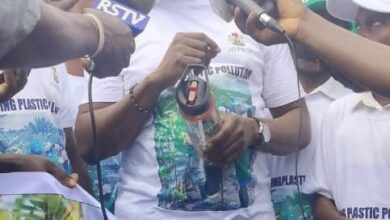Nigeria, Cameroon To Partner On Trans-border Ecosystem Conservation

Nigeria and Cameroon are soon expected to sign the Cooperation Framework Agreement on Trans-boundary Ecosystem Conservation and Sustainable Management of Forestry and Wildlife Resources.
Minister of State for Environment, Chief Sharon Ikeazor said this at the press briefing on the environment sector and priority areas of the Ministry in Abuja on Monday.
TheFact Nigeria reports that the briefing also dwelt on the ministerial mandates, performances and update on priority areas of focus for the Environment Ministry in 2022.
The Minister said, Nigeria had been facing several environmental challenges from desertification in the North, to flooding and coastal erosion in the South, deforestation, land degradation, pollution, loss of biodiversity and adverse impacts of climate change.
She said: “All these environmental degradations are adversely affecting the lives and livelihood of our people.
“The Ministry of Environment, we have been working with development partners, line ministries, MDAs, NGOs and CSOs, to address and ameliorate these problems through our policies, action plans and environmental regulations and projects.”
The Minister highlighted some established policies that have supported the implementation of the Ministry’s mandate amongst others are;
· National Policy on Environment 2017
· National policy on solid waste management 2020
· National Policy on Plastic waste management 2020
· National Forestry policy 2019
· National policy on climate change (revised 2021)
· National Biosafety Policy 2021
· National Action plan on gender and climate change 2020
· National Biosecurity policy and action plan 2022.
On afforestation, Chief Ikeazor said, the national afforestation programme under the green bond project had successfully forested 6,191,363 ha of land.
This according to her, was done through the green bond project implemented by; Forest Research Institute of Nigeria (FRIN), National NAGGW, Department of Desertification, land degradation and drought Management, National Parks Service (NPS), NGOs, State Governments, Private planters and international stakeholders.
The Minister revealed that a total of 6,550,056 seedlings, were raised, distributed to state governments and institutions and planted by Forest Research Institute of Nigeria (FRIN), Federal Department of Forestry, Nigeria Conservation Foundation (NCF) and tree restoration and planting company in 2020 under the forestry trust fund initiative.
She said: “The most significant action taken towards playing our role in climate change mitigation and adaptation is the signing of the Climate change bill into law by Mr President, in November 2021”.
On the the clean up of the Ogoni land, Chief Ikeazor said the on the instance of the Federal Government of Nigeria, UNEP conducted an independent assessment of hydrocarbon pollution in Ogoniland, in 2006.
The Minister said: “The Ministry is accelerating the remediation project, expanding on the livelihood program of the hydrocarbon impacted communities.
“Preliminary remediation activities had commenced in early 2018, and work is at various stages of the remediation processes, with successes despite delays encountered.
“The Project implementation status is between 2019-2021 and covers three (3) core areas, which are contaminated soil remediation, sustainable livelihood programme and portable water supply”.
She said that so far, a total of one thousand three hundred and thirty-seven (1,337) persons have been trained, employed, and earned income to support their livelihood, thereby enhancing the local economy.
On climate change, the Minister said that in the World Climate Change Vulnerability Index Nigeria was classified as one of the ten most vulnerable countries in the world.
“This poses a serious threat to poverty eradication and sustainable development in general,” she added.
The Minister said that the most critical step Nigeria had taken towards playing her role in climate change mitigation and adaptation was the realization of the Climate Change Act, in November 2021.
She explained that the Act provided for the establishment of the National Council on Climate Change, which would have the powers of policy making and decisions on all matters related to climate change in Nigeria.
On circular economy and waste management, the Minister said that Nigeria had taken proactive measures to promote, institutionalize, entrench, and mainstream circular economy principles and practices into our development plans.
“Nigeria’s Circular Economy potentials can be seen in its large and thriving Waste Management Sector that attracts operators due to the high volume of wastes and demand for recycled materials,” she said.
Chief Ikeazor said that her Ministry established a Nigeria Circular Economy Programme (NCEP) which provides a framework for circular solutions and circular business models.
“In demonstrating circular economy principles and practices, as well as environmentally sound management of waste, the Ministry, constructed and commissioned several waste recycling facilities.
“These include plastic recycling plant in Karu, Nasarawa State (2019), plastic recycling plant in Lokoja (2020) and a scrap metal recycling plant in Emouha, Rivers State (2020).
“All these plants were handed over to the communities.
“Development of other recycling plants is in progress in FCT, Imo, Benue, Nasarawa, Adamawa, Anambra, Ondo, Abia, and Kaduna States,” she said.
The Minister spoke on foreign support for her Ministry saying, with that support, the Ministry was operationalizing and cascading the policies to the sub-nationals.
“With the support of the Government of Japan and in collaboration with UNIDO, the Ministry would be implementing the project “Promoting Sustainable Plastic Value Chain” through Circular Economy practices in Lagos and the FCT.
“This project would promote the integration of Circular Economy principles and practices into plastic waste management, strengthen plastic value chains, and demonstrate the benefits of adopting circular economy practices and resource efficient production of plastic value chains in Nigeria.
“In 2021, Nigeria became a member Global Plastic Action Partnership (GPAP),” she said.
On marine pollution, Chief Ikeazor said the Ministry in collaboration with the World Bank was implementing the ProBlue project which is aimed at reducing Marine Plastic Pollution and Creating Plastics Recycling Markets in Lagos State with the objective to develop an improved knowledge base and increased capacity for Lagos State.
She said that this project would be replicated in all the coastal states of the country after the pilot in Lagos.
On conservation, ocean, afforestation, desertification and wildlife, the Minister said that several environmental challenges had led to the loss of biodiversity and threatens our existence.
She said the Ministry had taken several steps in combatting biodiversity loss through the Department of Forestry, the Department of Desertification, Land Degradation and Drought Management, and our Agencies, Forest Research Institute of Nigeria (FRIN), National Park Services (NPS) and National Agency for Great Green Wall (NAGGW).
Chief Ikeazor said that the Federal Ministry of Environment would continue to strive in achieving the set mandates despite all challenges while repositioning her agencies for effective implementation of policies, regulations and projects.
In his welcome address, Permanent Secretary in the Ministry, Engineer Hassan Musa said the Ministry has made considerable progress in addressing environmental concerns in the country.
The Permanent Secretary said this was made possible through collaboration with other MDAs, States and Local Governments.






